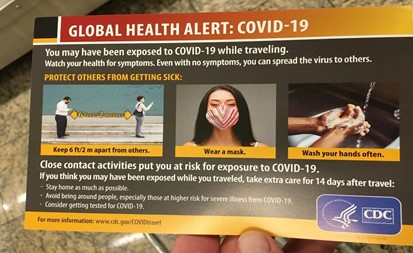By Bill Given, Founder of The Wild Source
Summary
My trip to Kenya was a great experience and I highly recommend Kenya right now for those considering travel. Kenya is taking Covid very seriously with proper precautions in place. I felt completely safe during my trip. There were few other travelers in the Masai Mara and the wildlife sightings were amazing. With low numbers of travelers, the travel was very easy – probably the easiest international travel that I’ve ever had.
Introduction
With the onset of Covid globally, Kenya shut down its borders mid-March and took a serious approach to protecting the citizens of Kenya. Kenya imposed a nighttime curfew and restricted domestic movement between regions. Mask and social distancing policies were implemented and strictly enforced in the Nairobi area. During June, The Tourism Board produced a 43-page Health & Safety Protocols document detailing the ‘New Normal.’ In order to be permitted to reopen, camps and hotels were required to have Covid protocols approved and pass government inspections. The World Travel & Tourism Council (WTTC) developed standards based on Center for Disease Control (CDC) and World Health Organization (WHO) guidance and issued a Safe Travels Designation for Kenya.
In mid-July Kenya opened for domestic travel between regions and at that time the safari camps that had passed inspection opened for residents. On August 1st, Kenya resumed international travel. Originally, word was travelers from the US would be required to quarantine upon arrival. This policy was quickly amended to waive quarantine requirements for US travelers arriving with proof of a negative PCR Covid test. Initially, travelers from California, Florida and Texas were still required to quarantine even with a negative test. This is no longer the case and now any US traveler may enter with a negative Covid test. Currently, quarantine is only required if a traveler is ill or shows symptoms of COVID-19.
With Kenya open for safari, I quickly made arrangements to travel to Kenya. Foremost, I wanted to return to Africa and reconnect with friends and partners as soon as possible. Also, as Kenya and other safari countries were open and we had interested travelers, we believed it was essential to lead the way and experience the new conditions prior to our guests traveling.
As always, the safari experience was extraordinary, and I found this to be the easiest travel experience I have ever had. Safety protocols are indeed in place and care for guests and local staff is taken seriously. With current traveler numbers very low, it makes the logistics of travel simple and fast, in addition to being awesome for wildlife viewing.
Pre-Trip Preparations and Required Covid Test
To visit Kenya, I had two Covid-related actions to perform beyond my normal packing. I needed to have a negative Covid test conducted within 96 hours of arrival to Kenya and submit an online Health Surveillance form.
Covid Testing
A negative PCR Covid test is required within 96 hours of arrival to Kenya. As is typical with government requirements, there are a few different interpretations floating around, namely whether the 96 hour window begins when the test is conducted or when the results are received. While you may encounter a more lenient Immigration official, The Wild Source recommends the conservative approach (have your test conducted or submit your sample for testing within the 96 hour window) to avoid potential headache on arrival.
With the news full of stories on delayed Covid test results, we did research and identified a private company formed by Colorado medical professionals, The Covid Consultants, who can have guaranteed results to travelers within 48 hours of submitting a saliva sample. The cost is higher than some other options, at $219 plus shipment of the kit to your home (cost does include the FedEx mailing of your sample to a lab in Texas), but I think it is an excellent option to have peace of mind that your test and results will happen within the necessary timeline. More and more testing options are becoming available so other easy choices should emerge.
The process for testing via The Covid Consultants was easy. First, you order your kit online. The kit is non-perishable so you can order it well in advance and avoid the expedited shipping cost. There will be an added shipping cost if you need to have it FedEx overnight. Upon ordering your kit, an email is sent with the basic instructions, including a very handy matrix table that advises what day you should collect your saliva sample and FedEx it to the lab in order to receive results in time based on the day of your flight. Every detail of their process is spelled out for you in the provided instructions.
The kit arrives in a box already addressed and ready for FedEx overnight mailing to the lab. There is a four-page booklet that includes easy step-by-step directions and photos that cover everything from taking your saliva sample (no nasal swab = easy and no discomfort!) to how to do the return shipping.
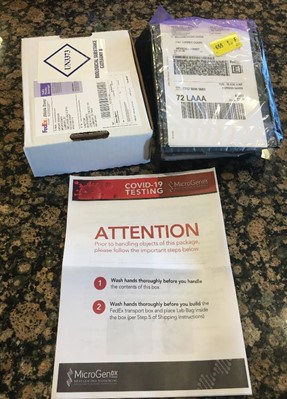
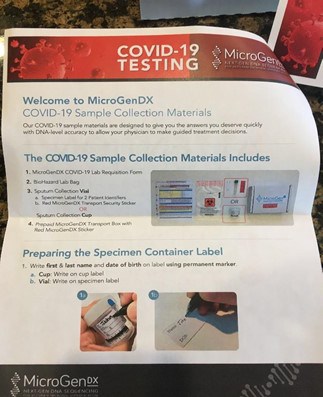
Providing the sample is literally just spitting into the cup. You label and bag the sample.
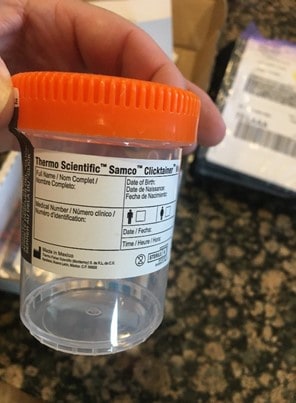
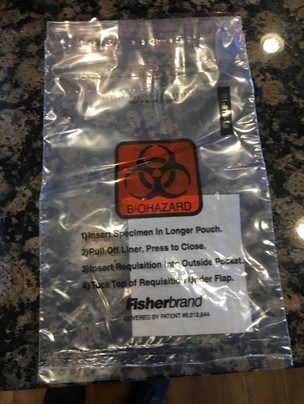
One tip is to tape the lid on the sample container as an extra precaution to ensure it doesn’t open and spill as this is the only real issue that could hang up this timely process. Once the sample is sealed inside the pre-addressed FedEx shipping box, it is ready to mail. Important note: Your sample is considered a Category B Biological Substance and FedEx employees will not accept that at their counter and not every drop off box is rated for Category B. You can easily find an appropriate drop off box online. To ensure there was no issue on this front, I went into FedEx and told the guy at the counter I had a Category B package to send. He pointed straight away to the FedEx mailbox inside the facility where I could place the package.
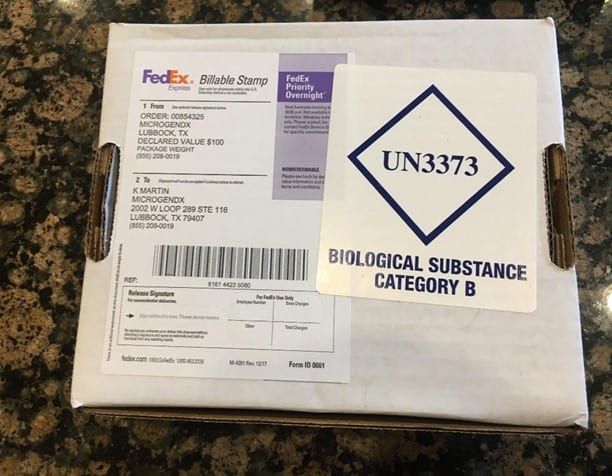
The Covid Consultants receive the results from the lab in less than 48 hours. The provided matrix advises when you can expect results. For example, if you FedEx the sample on Monday the results will be emailed to you by The Covid Consultants on Wednesday morning. The email you receive includes a pdf of the official test result marked as “Original” and specifies that it is a PCR test (important to have that documented). They also include the letter of Authorization from the FDA that proves it is a valid/authorized test. That is likely not needed for travel, but if there is any question of validity it is nice back up to have.
Kenya Health Surveillance Form
The Ministry of Health requires travelers to submit a Health Surveillance form, available at https://ears.health.go.ke/airline_registration/.
The form should be submitted online and should be filled out once you have received your negative Covid test. The form collects some basic personal data, contact tracing information, confirms you have a negative Covid test, and asks a few questions regarding potential Covid symptoms. When you submit the form online, you receive a QR code by email and as an instant pop-up PDF. You should print out the QR code and carry with you for arrival to Kenya. You can also show it digitally on your phone, but I always like to have paper in case your phone battery is out etc. There were clearly a number of travelers unaware of this requirement, which held up the line a bit as Health officers had to explain the requirement and then send those travelers to fill it out a paper version before they could enter.

Air Travel to Kenya
I flew with Delta from Denver to Atlanta, then had a connecting Delta flight from Atlanta to Amsterdam. My last leg was with KLM from Amsterdam to Nairobi, Kenya.
I had no worries about being on safari, but dealing with the long journey to get there with the added concerns of Covid safety was definitely the most daunting part of the journey. I was pleasantly surprised because with low numbers of travelers the ease of the travel was outstanding and relaxing. The easy travel more than made up for the inconvenience of needing to wear a mask for many hours.
Denver Airport was a breeze, I had to wait behind one person to check in for the flight and then walked right up to Homeland Security ID check and had one person in front of me to pass through security screening. Delta to Atlanta was keeping middle seats open and I ended up with my own row. Atlanta has the busiest airport in the US. I would estimate there were about 40% of the normal number of travelers, so it did not feel empty nor busy.
I had my first health check, simply a temperature check, as I boarded in Atlanta for Amsterdam. The boarding process was very fast with the plane at only 20 to 25% capacity. It was great to have an entire row to myself for the overnight flight. On board, we filled out a Contact Tracing form that was left with the Delta crew.
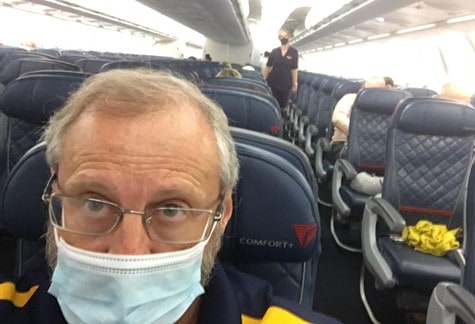
Arrival to Amsterdam was normal, I deplaned with no health checks. When reporting to the gate for my KLM flight from Amsterdam to Nairobi, they took a temperature reading and I was required to complete a short Netherlands Health Form with yes/no questions on symptoms.
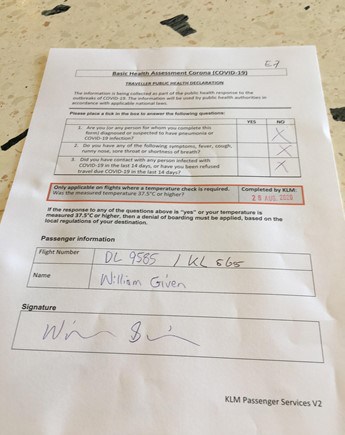
I was near the back of the flight from Amsterdam to Nairobi, with even less passengers, providing me with my own row and a lot of additional space.
On arrival to Kenya, we were slow to deplane (as mentioned I was near the back). Nairobi had the highest standard of Covid care precautions (compared to Amsterdam, Paris, and Atlanta). Everyone was practicing social distancing. Beyond the top of the jetway, there were two health officers who were taking temperatures, and checking negative Covid test results.
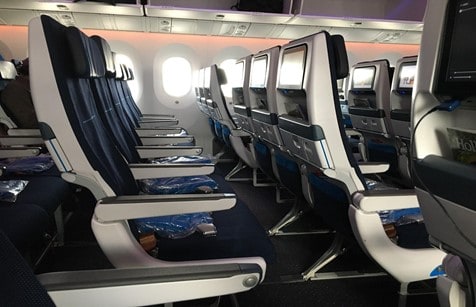
I then continued on to another Health officer who scanned the QR Code to verify submittal of the Kenya Health Surveillance form (best to submit online before travel and then carry the QR code). After that I proceeded to Immigration as usual to have my passport stamped. At the Immigration counters there were marks on the ground to help with social distancing.
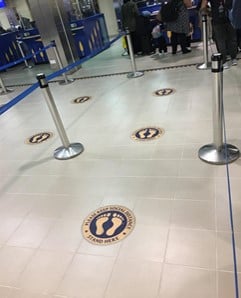
Overnight in Nairobi
After collecting my luggage I exited the airport as normal and was met by a driver with my name on a sign. The driver wore a mask and provided me with hand sanitizer before my private transport. I had a short overnight stay in Nairobi at the Tamarind Tree Hotel.
I arrived at the hotel around 11:30 p.m. for a quick sleep. Before entering the hotel there was a sink to wash hands, followed by hand sanitizer. My temperature was checked. More sanitizer was offered to me at the front desk, which I declined as I was already well sanitized. I was escorted to my room and told that, due to distancing rules, only two people could be on the elevator, and yes, there was a sanitizer dispenser on the elevator. At breakfast, a staff member served all food from the buffet so that guests did not share tongs. This was definitely the most Covid cautious atmosphere I had experienced to-date and certainly makes travelers aware that Kenya tourism is on top of the issue and that safety of visitors and staff is paramount.
Wilson Regional Airport
I had a morning transfer, same driver from the hotel with mask and private vehicle, to Wilson Airport for my morning flight to Masai Mara. At the entrance to the Safarilink terminal there was hand sanitizer, followed by a temperature check before going through security. The check-in counter had protective glass between passengers and Safarilink agents. There was signage regarding wearing masks, the ground was thoroughly marked for social distancing, and there were sanitizer dispensers mounted on the walls. This is a small terminal with a coffee café and there were very few passengers waiting for flights, about ten total.
My flight had five passengers on a Caravan (which can usually carry 12 passengers, plus the two pilots). There were no distancing directions, but people just picked seats as desired and masks were required for the duration of the flight (only 45 minutes). Please note that Safarilink (and possibly other regional flight operators) specify that passengers must wear masks. We recommend that you travel with your own supply.
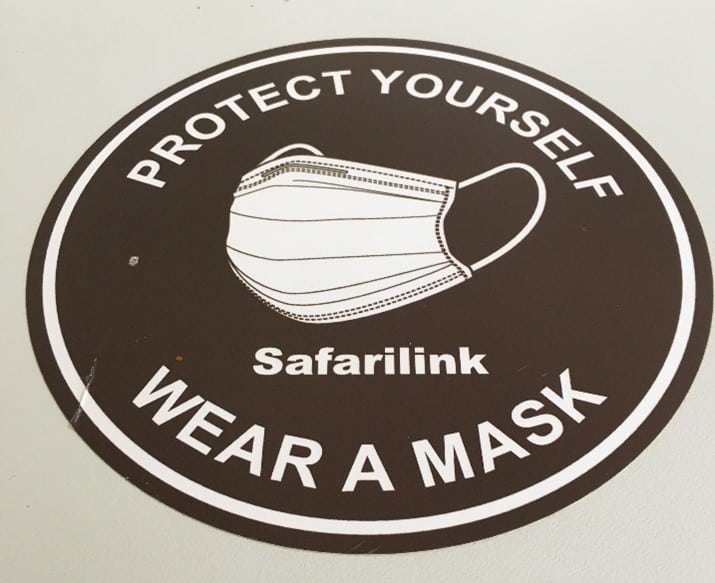
Safari in the Mara
I visited five different camps, operated by four different companies, to get a broad sampling of how each is handling Covid Protocols. The precautions and experiences at the camps are very consistent due to the effort of the Kenya Tourism Ministry in developing and distributing thorough guidance and then conducting required inspection to certify each operation before opening.
The new standard is that your guide meets you at the airstrip wearing a mask. For those who want contact, elbow bumps are a common replacement for handshakes and hugs. After many months of not knowing when we might all be together, it was special for me to be greeted at the airstrip by many of my Kenya family, including Enaidura Camp owners, guides, and frontman Brian.
The camps I visited included Enaidura Camp, Basecamp Explorer Eagle View and Leopard Hill Camps (day visit only for this one), Porini Lion, and Asilia’s Naboisho Camp. Arrival always included a greeting from masked camp staff and management.
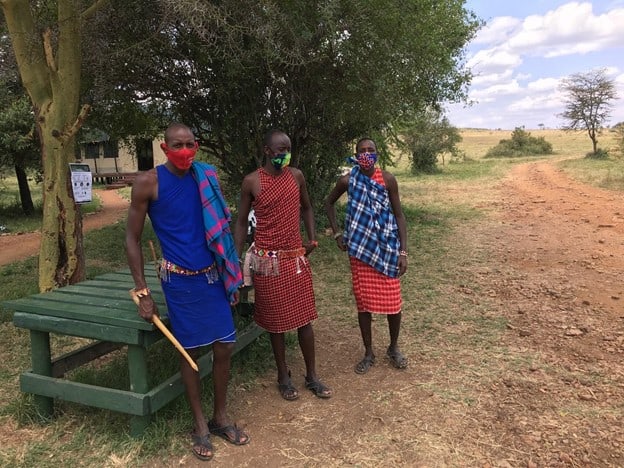
Porini Lion Staff
Following the greeting, guests have their temperature taken and are invited to wash their hands. Each camp had a hand washing facility in the arrival area. Then onto the normal briefing by the camp manager, which included advising about the camp’s Covid policies. Key policies at all camps focused on wearing masks in public (not required for guests dining or drinking), social distancing, and that the camps are frequently disinfecting high-touch surfaces. Camps have displayed signs to remind guests and staff of the protocols. Dining occurs with each party at its own distanced table.
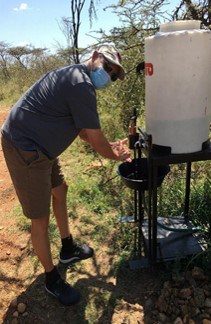
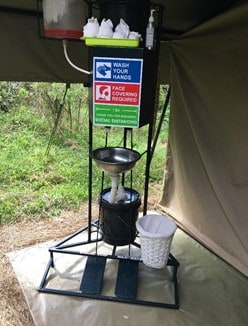
Hand wash on arrival to Basecamp Eagle View. On the right Enaidura Camp had a great pedal system for washing without touching a tap.
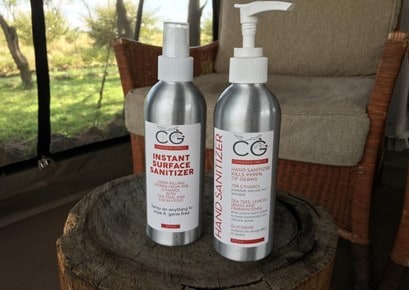
Hand sanitizer was readily available in camps and on game drives.
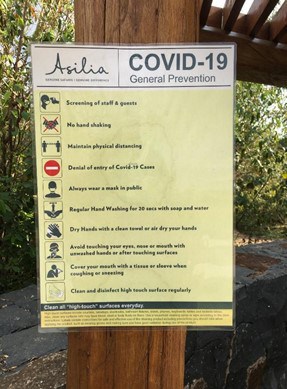
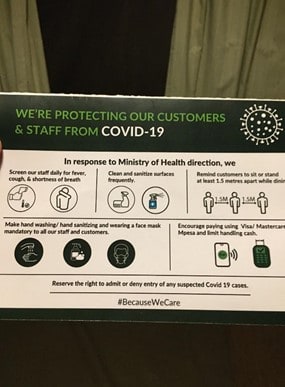
Camps display signage making clear the Covid prevention protocols.
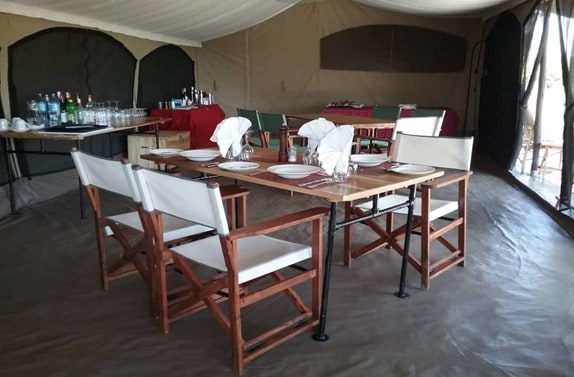
Meals are served in the well-ventilated dining tent with each party at a private table, socially distanced from other diners.
Game drives were exceptional as usual in the Mara! It is sad to have a tiny fraction of normal tourist numbers currently, but the travelers pioneering the return to safari get to enjoy this benefit of more exclusive game viewing. After months of lockdown there was fortunately a surge of domestic tourism with many Nairobi residents flocking to the Mara, especially Thursday through Sunday. With that domestic tourism, the Mara is not empty of people, but I would estimate there were about 15% of the vehicles that would normally be there at this prime time. It is predicted that, come October, domestic tourism is likely to fall off significantly as virtually everyone in that market who wanted to get on safari has done so over the 10 weeks that travel has been open to Kenyans.
Guides are wearing masks on game drives, though with the open air and spacing in the vehicle, some guides are slipping the mask below the nose at times. Guides are likely to take cues from their guests and adhere to strict protocol for guests desiring it, while loosening a bit with guests that are relaxed themselves about mask wearing.
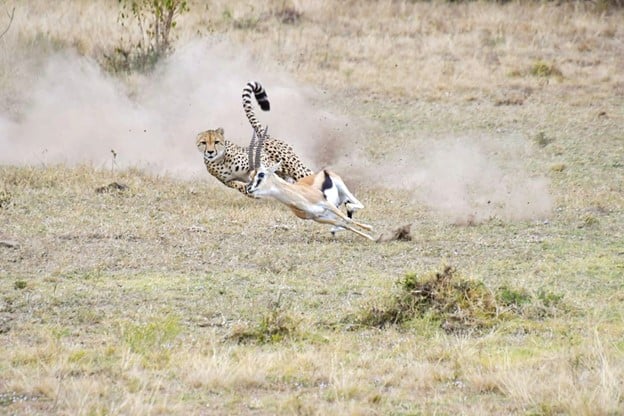
Photo by legendary guide, Ping.
On my safari, the Mara lived up to its reputation for big cats, with a great deal of time spent observing lion, leopard, and cheetah. We saw big migration herds of wildebeest but there was a lull in the river crossings at that time. Interestingly, the topi and Thomson’s gazelles were already calving, which is about two months ahead of typical timing. This is likely due to lots of rain early in 2020.
Private Options for More Space
I was personally comfortable with the excellent protocols in place, but for those wanting additional spacing/less exposure to other travelers, it is possible to obtain private safari options for an additional cost.
Private Charter Flights
Safari Trails, our Kenya ground partner, arranged a private charter experience for my departure from the Mara. You really get the red carpet treatment and, with only your party and the pilots on board, you certainly minimize your exposure to other people. There is a plastic barrier between the pilot and passenger areas (this is not quite air-tight), and you have seat choices that are well distanced too.
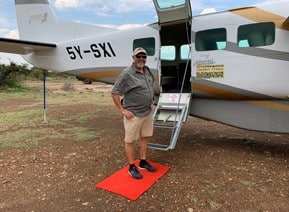
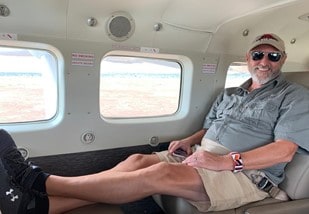
VIP Luxury Nairobi Road Transfers
All of our guests arriving in Nairobi have private road transfers. These may be done in a safari vehicle, a van, or a 4-door sedan – this is determined according to party size and availability of vehicles on that date. The driver wears a mask. For those who want to be assured of extra space we can, for a small premium, reserve a luxury executive van. For parties of two, this provides ample room for social distancing from the driver.
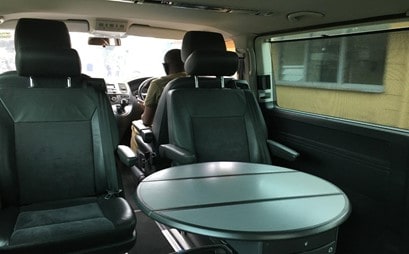
Private Guide and Vehicle on Safari
Most Kenya safaris include game drives on a shared basis, meaning guests at a camp are paired up with a maximum of six guests to a vehicle (by contrast, almost all of our Tanzania safaris are planned with a private guide/vehicle as the standard). In Kenya, most of the camps we use have open-sided vehicles which are ideal during this time. Most camps have a limited number of vehicles to work with, but typically each camp has at least one vehicle that can be reserved as a private vehicle for exclusive use by your party. Depending on the camp, this typically adds $300 to $400 per day (not per person) to your safari cost.
Private Safari Camp
Families and small groups of friends are booking out entire camps to ensure a private experience. This will be tough to accommodate in the peak season of 2021 as, between 2020 postponements and regular reservations, availability is pretty tight July through September. However, between now and June 2021 there are great possibilities to book a full camp for a private stay. Special deals are possible, such as the ability to stay privately at a 16-bed camp while only paying for 10 guests. Check with our planning team for possible special deals on private camps.
International Return Travel
Travel back from Kenya to the US was even easier than the low-key arrival trip. The extra precautions were primarily only in Nairobi at Jomo Kenyatta Airport, and with low traveler numbers the process was fast and easy.
There was a temperature scan before allowing entry into the Airport terminal. I had no wait to go through the initial security upon entering the terminal, and I walked straight up to the check-in counter. I was also able to walk immediately up to Immigration and security. I was then able to relax in the fairly empty Simba Lounge. There was another temperature check before boarding Nairobi to Paris on Air France.
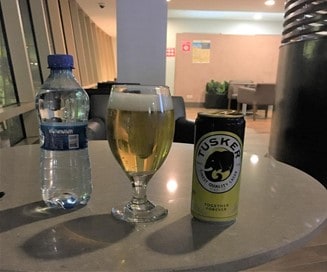
The flight to Paris was only 15% or so full and I, once again, had my own row of three to stretch out on the overnight flight. On arrival to Paris there were no procedures, no forms to fill out, and no temperature check. I had breakfast and relaxed in the Air France lounge. The shops and restaurants in the airport were open (95% were closed when I transited through in March on my way back from India). Traffic in the airport was light; I would guess 25% or less of normal capacity.
I boarded another very empty Delta plane heading to Atlanta, with no temperature check or any special procedures. I again had my own row and lots of other space around me as economy class had very few passengers. As throughout all the air travel, masks remained a requirement.
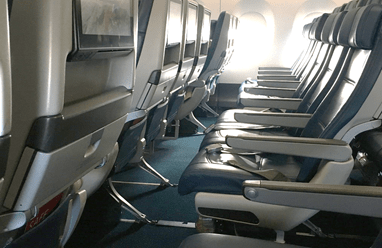
On arrival to Atlanta we had to turn in a Health Declaration form, which was simply contact details and three yes/no Covid symptom questions. On deplaning, I handed the form to a Health officer (no temperature check for me but there was for some passengers, perhaps non-Americans?) and I received the following CDC Covid Alert card. I then passed quickly through Immigration (short line, waited about 5 people) and was admitted into the US.
